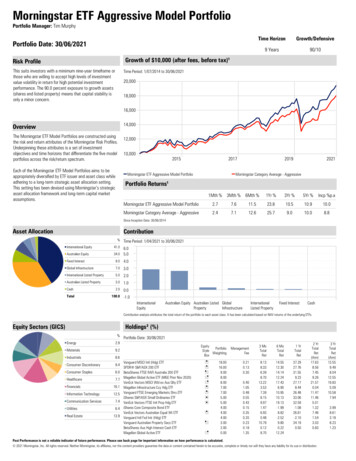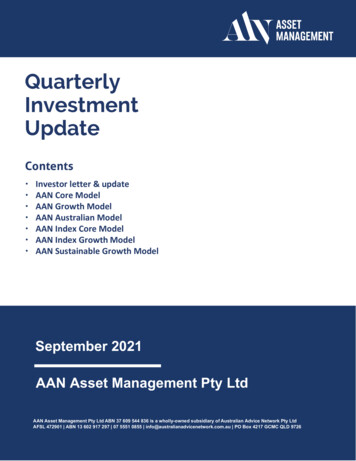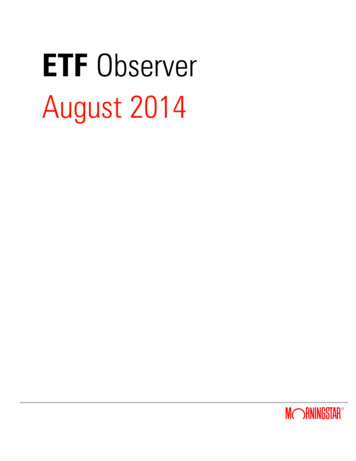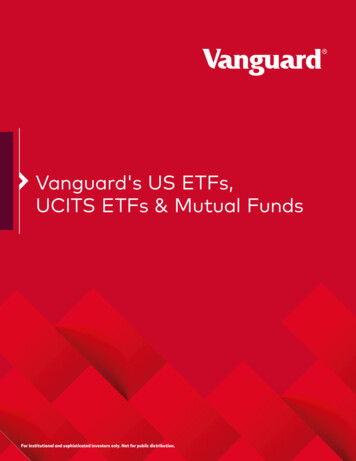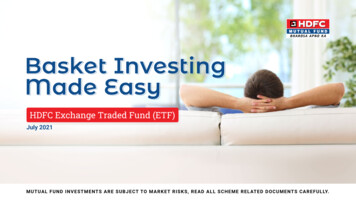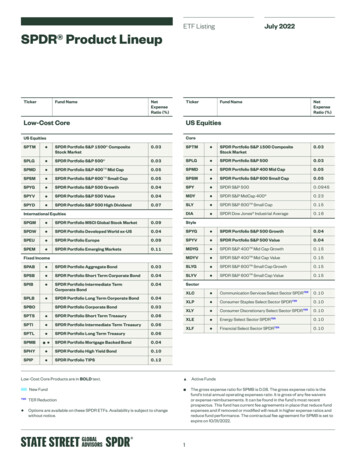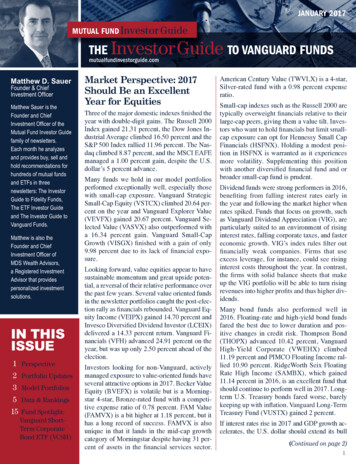
Transcription
Vanguard ESG International Stock ETFSupplement Dated March 21, 2022, to the Prospectusand Summary Prospectus Dated December 17, 2021Important Changes to Vanguard ESG International Stock ETF (the Fund)Effectively immediately, the following changes are made to the Fund’sProspectus and Summary Prospectus in connection with FTSE Russell’s recentmodifications to the methodology for the FTSE Global All Cap ex US ChoiceIndex tracked by the Fund.Prospectus and Summary Prospectus Text ChangesThe “Principal Investment Strategies” section under the ETF Summary isreplaced with the following:Principal Investment StrategiesThe Fund employs an indexing investment approach designed to track theperformance of the FTSE Global All Cap ex US Choice Index. The Index, which ismarket capitalization-weighted, is composed of large-, mid-, and small-cap stocksof companies in developed and emerging markets, excluding the United States,that are screened for certain environmental, social, and corporate governance(ESG) criteria by the Index sponsor, which is independent of Vanguard. The FTSEGlobal All Cap ex US Choice Index excludes the stocks of companies that FTSERussell (FTSE) determines engage in, have a specified level of involvement in,and/or derive threshold amounts of revenue from certain activities or businesssegments related to the following: adult entertainment, alcohol, tobacco,cannabis, gambling, chemical and biological weapons, cluster munitions,anti-personnel landmines, nuclear weapons, conventional military weapons,civilian firearms, nuclear power, and coal, oil, or gas. The level or type ofinvolvement in, or amount of revenue earned from, certain activities or businesssegments that lead to exclusion by FTSE can vary from one activity or businesssegment to another. The Index methodology also excludes the stocks ofcompanies that, as FTSE determines based on its internal assessment, do notmeet certain labor, human rights, environmental, and anti-corruption standardsas defined by the United Nations Global Compact Principles, as well ascompanies that do not meet certain diversity criteria.
See the Security Selection section for more information regarding the Indexexclusions. The components of the Index are likely to change over time.The Fund invests by sampling the Index, meaning that it holds a broadlydiversified collection of securities that, in the aggregate, approximates the fullIndex in terms of key characteristics. These key characteristics include industryweightings and market capitalization, as well as certain financial measures, suchas price/earnings ratio and dividend yield.Prospectus Text ChangesIn More on the Fund and ETF Shares, the description of the FTSE Global AllCap ex US Choice Index under the “Security Selection” section is replaced withthe following:FTSE Global All Cap ex US Choice Index. The FTSE Global All Cap ex USChoice Index is maintained by FTSE, a widely known global index provider. TheIndex is a subset of the FTSE Global Choice Index Series, which is designed tohelp investors align their investment portfolios with their values by excludingcompanies based on the impact of their conduct or products on society and/orthe environment. The FTSE Global All Cap ex US Choice Index excludes stocks ofcompanies that FTSE determines engage in, have a specified level ofinvolvement in, and/or derive threshold amounts of revenue from one or more ofthe following activities: (i) produce adult entertainment; own/operate adultentertainment establishments; distribute adult entertainment materials; (ii)manufacture alcoholic beverages; supply alcohol-related products/services toalcoholic beverage manufacturers; involved in distribution and/or retail sale ofalcoholic beverages; (iii) manufacture tobacco products; supply tobacco relatedproducts/services; involved in distribution and/or retail sale of tobacco products;(iv) engage in cannabis cultivation, cannabis distribution, the processing anddistribution of cannabis plants, and the creation of cannabis derivative productsper the Industry Classification Benchmark (ICB) standards; (v) own and/oroperate a gambling establishment; manufacture specialized equipment usedexclusively for gambling; provide supporting products/services to gamblingoperations; (vi) produce chemical or biological weapons and their components;(vii) produce (or produce specific and critical parts or services for) clustermunitions; (viii) produce (or produce specific and critical parts or services for)anti-personnel mines; (ix) produce nuclear weapons or their components; (x)manufacture military weapons systems and/or integral, tailor-made componentsof these weapons; provide tailor-made products and/or services that supportmilitary weapons; provide non-weapons related tailor-made products and/orservices related to the military or defense industry; (xi) produce and sell assaultweapons or small arms to civilian customers; produce and sell key components
of small arms; involved in the retail and/or distribution of assault weapons orsmall arms; (xii) involved in the operation and supply of nuclear powergeneration, that harnesses the energy present within atomic nuclei or theircomponents; engaged in the development, processing, production anddistribution of equipment and facilities that are specifically designed for andcritical to the generation of nuclear power; (xiii) own proved or probable reservesin coal, oil, or gas; (xiv) any company that FTSE determines per the ICBstandards: (a) engages in the exploration for and drilling, production, and supplyof crude oil on land or in offshore areas; (b) primarily engages in the refining andmarketing of petroleum products; (c) supplies equipment and services to oilfields and offshore platforms; (d) operates pipelines carrying oil, gas or otherforms of fuel; (e) engages in all three fields of petroleum production: extraction(upstream), transportation (midstream), and refining and marketing(downstream); or (f) mines, processes and markets coal per the ICB standards;and (xv) generate electricity from oil and/or gas, or thermal coal. The level or typeof involvement in, or amount of revenue earned from, certain activities orbusiness segments that lead to exclusion by FTSE can vary from one activity orbusiness segment to another.The Index methodology also excludes the stocks of companies that, as FTSEdetermines based on its internal assessment, do not meet certain labor, humanrights, environmental, and anti-corruption standards as defined by the UnitedNations Global Compact Principles, as well as companies that fail to meet two ofthe following three diversity criteria: (1) at least one woman on the board; (2)diversity policies in place; and (3) diversity management systems in place. FTSEuses internal methodologies to analyze various factors in determining whether acompany meets the foregoing criteria and/or falls within a particular industry,including whether the company has a certain amount of revenue derived from anindustry, the company’s level of involvement in an industry, and the severity ofcertain controversies (as determined by FTSE), which can vary from onecompany to another and from one activity to another. For additional detailsregarding the Index methodology, please see the Methodology section of FTSE’swebsite for the Global Choice Index Series. As of March 21, 2022, the number ofstocks (components) in the Index was approximately 5,642. The components ofthe Index are reconstituted on a quarterly basis and are likely to change overtime.Additional information related to the United Nations Global Compact Principles isavailable at /principles.
2022 The Vanguard Group, Inc. All rights reserved.Vanguard Marketing Corporation, Distributor.PS 4394A 032022
Vanguard ESG International Stock ETFProspectusDecember 17, 2021Exchange-traded fund shares that are not individually redeemable and arelisted on Cboe BZX Exchange, Inc.Vanguard ESG International Stock ETF Shares (VSGX)This prospectus contains financial data for the Fund through the fiscal year ended August 31, 2021.The Securities and Exchange Commission (SEC) has not approved or disapproved thesesecurities or passed upon the adequacy of this prospectus. Any representation to the contrary isa criminal offense.
ContentsETF Summary Investing in Vanguard ETF Shares1 Financial Highlights278 Glossary of Investment Terms29Investing in Index Funds10More on the Fund and ETF Shares11The Fund and Vanguard20Investment Advisor20Dividends, Capital Gains, and Taxes22Share Price and Market Price24Additional Information26
ETF SummaryInvestment ObjectiveThe Fund seeks to track the performance of a benchmark index that measuresthe investment return of large-, mid-, and small-capitalization stocks ofcompanies located in developed and emerging markets outside of theUnited States and is screened for certain environmental, social, and corporategovernance criteria.Fees and ExpensesThe following table describes the fees and expenses you may pay if you buy,hold, and sell shares of the Fund. You may pay other fees, such as brokeragecommissions and other fees to financial intermediaries, which are not reflectedin the table and example below.Shareholder Fees(Fees paid directly from your investment)Transaction Fee on Purchases and SalesTransaction Fee on Reinvested Dividends*None*None*None through Vanguard (Broker fees vary)Annual Fund Operating Expenses(Expenses that you pay each year as a percentage of the value of your investment)Management Fees0.09%12b-1 Distribution FeeOther ExpensesTotal Annual Fund Operating ExpensesNone0.03%0.12%1
ExampleThe following example is intended to help you compare the cost of investing inthe Fund with the cost of investing in other funds. It illustrates the hypotheticalexpenses that you would incur over various periods if you were to invest 10,000 in the Fund’s shares. This example assumes that the Fund provides areturn of 5% each year and that total annual fund operating expenses remain asstated in the preceding table. You would incur these hypothetical expenseswhether or not you were to sell your shares at the end of the given period.Although your actual costs may be higher or lower, based on these assumptionsyour costs would be:1 Year 123 Years 395 Years 6810 Years 154This example does not include the brokerage commissions that you may pay tobuy and sell shares of the Fund.Portfolio TurnoverThe Fund pays transaction costs, such as commissions, when it buys and sellssecurities (or “turns over” its portfolio). A higher portfolio turnover rate mayindicate higher transaction costs and may result in more taxes when Fundshares are held in a taxable account. These costs, which are not reflected inannual fund operating expenses or in the previous expense example, reduce theFund’s performance. During the most recent fiscal year, the Fund’s portfolioturnover rate was 7% of the average value of its portfolio.Principal Investment StrategiesThe Fund employs an indexing investment approach designed to track theperformance of the FTSE Global All Cap ex US Choice Index. The Index, which ismarket capitalization-weighted, is composed of large-, mid-, and small-cap stocksof companies in developed and emerging markets, excluding the United States,that are screened for certain environmental, social, and corporate governance(ESG) criteria by the Index sponsor, which is independent of Vanguard. The FTSEGlobal All Cap ex US Choice Index excludes stocks of companies that FTSEGroup (FTSE) determines engage in and/or derive threshold amounts of revenuefrom the following activities: (i) produce adult entertainment; (ii) producealcoholic beverages; (iii) produce tobacco products; (iv) produce (or producespecific and critical parts or services for) nuclear weapon systems, chemical orbiological weapons, cluster munitions, and anti-personnel mines; (v) produceother weapons for military use; (vi) produce firearms or ammunition fornon-military use; (vii) own proved or probable reserves in coal, oil, or gas, or any2
company that FTSE determines has a primary business activity in: (a) theexploration and drilling for, as well as producing, refining, and supplying, oil andgas products, (b) the supply of equipment and services to oil fields and offshoreplatforms, (c) the operations of pipelines carrying oil, gas, or other forms of fuel,(d) integrated oil and gas companies that provide a combination of services listedin (a)-(c) above, including the refining and marketing of oil and gas products, or(e) the exploration for or mining of coal; (viii) provide gambling services; and (ix)generate revenues from nuclear power production. The level of involvement in,or amount of revenue earned from, certain business lines or activities can varyfrom one company to another. The Index methodology also excludes the stocksof companies that, as FTSE determines, do not meet the labor, human rights,environmental, and anti-corruption standards as defined by the United NationsGlobal Compact Principles, as well as companies that do not meet certaindiversity criteria.See the Securities Selection section for more information regarding the Indexexclusions. The components of the Index are likely to change over time.The Fund invests by sampling the Index, meaning that it holds a broadlydiversified collection of securities that, in the aggregate, approximates the fullIndex in terms of key characteristics. These key characteristics include industryweightings and market capitalization, as well as certain financial measures, suchas price/earnings ratio and dividend yield.Principal RisksAn investment in the Fund could lose money over short or long periods of time.You should expect the Fund’s share price and total return to fluctuate within awide range. The Fund is subject to the following risks, which could affect theFund’s performance: Stock market risk, which is the chance that stock prices overall will decline.Stock markets tend to move in cycles, with periods of rising prices and periodsof falling prices. The Fund‘s investments in foreign stocks can be riskier than U.S.stock investments. Foreign stocks may be more volatile and less liquid than U.S.stocks. The prices of foreign stocks and the prices of U.S. stocks may move inopposite directions. In addition, the Fund‘s target index may, at times, becomefocused in stocks of a particular market sector, which would subject the Fund toproportionately higher exposure to the risks of that sector. Investment style risk, which is the chance that returns from non-U.S. smalland mid-capitalization stocks will trail returns from global stock markets.Historically, non-U.S. small- and mid-cap stocks have been more volatile in pricethan the large-cap stocks that dominate the global markets, and they often3
perform quite differently. The stock prices of small and mid-size companies tendto experience greater volatility because, among other things, these companiestend to be more sensitive to changing economic conditions. ESG investing risk, which is the chance that the stocks screened by the indexsponsor for ESG criteria generally will underperform global stock markets as awhole or that the particular stocks selected for the FTSE Global All Cap ex USChoice Index will, in the aggregate, trail returns of other funds screened for ESGcriteria. There are significant differences in interpretations of what it means for acompany to meet ESG criteria. The index sponsor’s assessment of a company,based on the company’s level of involvement in a particular industry or the indexsponsor’s own ESG criteria, may differ from that of other funds or of theadvisor’s or an investor’s assessment of such company. As a result, thecompanies deemed eligible by the index sponsor may not reflect the beliefs andvalues of any particular investor and may not exhibit positive or favorable ESGcharacteristics. The index provider is dependent on the availability of timely andaccurate ESG data being reported by companies in the index to evaluate theirESG criteria. In addition, the Fund’s target index may, at times, become focusedin stocks of a particular market sector, which would subject the Fund toproportionately higher exposure to the risks of that sector. Country/regional risk, which is the chance that world events—such as politicalupheaval, financial troubles, or natural disasters—will adversely affect the valueof securities issued by companies in foreign countries or regions. Because theFund may invest a large portion of its assets in securities of companies locatedin any one country or region, the Fund’s performance may be hurtdisproportionately by the poor performance of its investments in that area.Country/regional risk is especially high in emerging markets. Emerging markets risk, which is the chance that the stocks of companieslocated in emerging markets will be substantially more volatile, and substantiallyless liquid, than the stocks of companies located in more developed foreignmarkets because, among other factors, emerging markets can have greatercustodial and operational risks; less developed legal, tax, regulatory, andaccounting systems; and greater political, social, and economic instability thandeveloped markets. Currency risk, which is the chance that the value of a foreign investment,measured in U.S. dollars, will decrease because of unfavorable changes incurrency exchange rates. Currency risk is especially high in emerging markets. Index sampling risk, which is the chance that the securities selected for theFund, in the aggregate, will not provide investment performance matching thatof the Fund’s target index.4
Because ETF Shares are traded on an exchange, they are subject toadditional risks: The Fund’s ETF Shares are listed for trading on Cboe BZX Exchange, Inc., andare bought and sold on the secondary market at market prices. Although it isexpected that the market price of an ETF Share typically will approximate its netasset value (NAV), there may be times when the market price and the NAV differsignificantly. Thus, you may pay more or less than NAV when you buy ETFShares on the secondary market, and you may receive more or less than NAVwhen you sell those shares. Although the Fund’s ETF Shares are listed for trading on Cboe BZX Exchange,Inc., it is possible that an active trading market may not be maintained. Trading of the Fund’s ETF Shares may be halted by the activation of individualor marketwide trading halts (which halt trading for a specific period of time whenthe price of a particular security or overall market prices decline by a specifiedpercentage). Trading of the Fund’s ETF Shares may also be halted if (1) theshares are delisted from Cboe BZX Exchange, Inc., without first being listed onanother exchange or (2) Cboe BZX Exchange, Inc., officials determine that suchaction is appropriate in the interest of a fair and orderly market or for theprotection of investors.An investment in the Fund is not a deposit of a bank and is not insured orguaranteed by the Federal Deposit Insurance Corporation or any othergovernment agency.Annual Total ReturnsThe following bar chart and table are intended to help you understand the risksof investing in the Fund. The bar chart shows how the performance of the Fund’sETF Shares (based on NAV) has varied from one calendar year to another overthe periods shown. The table shows how the average annual total returns of theFund compare with those of its target index and another comparative index,which have investment characteristics similar to those of the Fund. Returns forthe FTSE indexes shown are adjusted for withholding taxes applicable toU.S.-based funds organized as Delaware statutory trusts. Keep in mind that theFund’s past performance (before and after taxes) does not indicate how the Fundwill perform in the future. Updated performance information is available on ourwebsite at vanguard.com/performance or by calling Vanguard toll-free at800-662-7447.5
Annual Total Returns — Vanguard ESG International Stock ETF Shares12019202030%25%22.8020%13.5215%10%5%0%1 The year-to-date return as of the most recent calendar quarter, which ended on September 30, 2021, was 5.34%.During the periods shown in the bar chart, the highest and lowest returns for acalendar quarter were:HighestLowestTotal Return18.01%-22.91%QuarterJune 30, 2020March 31, 2020Average Annual Total Returns for Periods Ended December 31, 20201 YearSinceFundInceptionVanguard ESG International Stock ETF SharesBased on NAVReturn Before TaxesReturn After Taxes on DistributionsReturn After Taxes on Distributions and Sale of FundSharesBased on Market PriceReturn Before TaxesFTSE Global All Cap ex US Choice Index(reflects no deduction for fees or expenses)FTSE Global All Cap ex US Index(reflects no deduction for fees or expenses)FundInceptionDate9/18/201813.52% 10.03%12.999.478.277.6413.019.9313.60% 10.22%11.248.75Actual after-tax returns depend on your tax situation and may differ from thoseshown in the preceding table. When after-tax returns are calculated, it isassumed that the shareholder was in the highest individual federal marginalincome tax bracket at the time of each distribution of income or capital gains orupon redemption. State and local income taxes are not reflected in thecalculations. Please note that after-tax returns are not relevant for a shareholderwho holds fund shares in a tax-deferred account, such as an individual retirement6
account or a 401(k) plan. Also, figures captioned Return After Taxes onDistributions and Sale of Fund Shares may be higher than other figures for thesame period if a capital loss occurs upon redemption and results in an assumedtax deduction for the shareholder.Investment AdvisorThe Vanguard Group, Inc. (Vanguard)Portfolio ManagersScott E. Geiger, CFA, Portfolio Manager at Vanguard. He has co-managed theFund since its inception in 2018.Christine D. Franquin, Principal of Vanguard. She has co-managed the Fund sinceits inception in 2018.Purchase and Sale of Fund SharesETF Shares may only be bought and sold in the secondary market through abrokerage firm. The price you pay or receive for ETF Shares will be the prevailingmarket price, which may be more (premium) or less (discount) than the NAV ofthe shares. The brokerage firm may charge you a commission to execute thetransaction. Unless imposed by your brokerage firm, there is no minimum dollaramount you must invest and no minimum number of shares you must buy. ETFShares of the Fund cannot be directly purchased from or redeemed with theFund, except by certain authorized broker-dealers. These broker-dealers maypurchase and redeem ETF Shares only in large blocks (Creation Units), typicallyin exchange for baskets of securities.An investor may incur costs attributable to the difference between the highestprice a buyer is willing to pay to purchase ETF Shares (bid) and the lowest price aseller is willing to accept for ETF Shares (ask) when buying or selling shares inthe secondary market (bid-ask spread). Recent information, including informationon the Fund’s NAV, market price, premiums and discounts, and bid-ask spreads,is available online at vanguard.com.Tax InformationThe Fund’s distributions may be taxable as ordinary income or capital gain. If youare investing through a tax-advantaged account, such as an IRA or anemployer-sponsored retirement or savings plan, special tax rules apply.Payments to Financial IntermediariesThe Fund and its investment advisor do not pay financial intermediaries for salesof Fund shares.7
Investing in Vanguard ETF SharesWhat Are Vanguard ETF Shares?Vanguard ETF Shares are an exchange-traded class of shares issued by certainVanguard funds. ETF Shares represent an interest in the portfolio of stocks orbonds held by the issuing fund.How Are Vanguard ETF Shares Different From Conventional MutualFund Shares?Conventional mutual fund shares can be directly purchased from and redeemedwith the issuing fund for cash at the net asset value (NAV), typically calculatedonce a day. ETF Shares, by contrast, cannot be purchased directly from orredeemed directly with the issuing fund by an individual investor. Rather, ETFShares can only be purchased or redeemed directly from the issuing fund bycertain authorized broker-dealers. These broker-dealers may purchase andredeem ETF Shares only in large blocks (Creation Units), usually in exchange forbaskets of securities and not for cash (although some funds issue and redeemCreation Units in exchange for cash or a combination of cash and securities).An organized secondary trading market is expected to exist for ETF Shares,unlike conventional mutual fund shares, because ETF Shares are listed fortrading on a national securities exchange. Individual investors can purchase andsell ETF Shares on the secondary market through a broker. Secondary-markettransactions occur not at NAV, but at market prices that are subject to changethroughout the day based on the supply of and demand for ETF Shares, changesin the prices of the fund’s portfolio holdings, and other factors.The market price of a fund’s ETF Shares typically will differ somewhat from theNAV of those shares. The difference between market price and NAV is expectedto be small most of the time, but in times of market disruption or extrememarket volatility, the difference may become significant.8
How Do I Buy and Sell Vanguard ETF Shares?ETF Shares of the Fund are listed for trading on Cboe BZX Exchange, Inc. Youcan buy and sell ETF Shares on the secondary market in the same way you buyand sell any other exchange-traded security—through a broker. Your broker maycharge a commission to execute a transaction. You will also incur the cost of the“bid-ask spread,” which is the difference between the highest price a buyer iswilling to pay to purchase ETF Shares (bid) and the lowest price a seller is willingto accept for ETF Shares (ask) when buying or selling shares in the secondarymarket. Because secondary-market transactions occur at market prices, you maypay more (premium) or less (discount) than NAV when you buy ETF Shares andreceive more or less than NAV when you sell those shares. In times of severemarket disruption, the bid-ask spread and premiums/discounts can increasesignificantly. Unless imposed by your broker, there is no minimum dollar amountyou must invest and no minimum number of ETF Shares you must buy.Your ownership of ETF Shares will be shown on the records of the brokerthrough which you hold the shares. Vanguard will not have any record of yourownership. Your account information will be maintained by your broker, whichwill provide you with account statements, confirmations of your purchases andsales of ETF Shares, and tax information. Your broker also will be responsible forensuring that you receive income and capital gains distributions, as well asshareholder reports and other communications from the fund whose ETF Sharesyou own. You will receive other services (e.g., dividend reinvestment andaverage cost information) only if your broker offers these services.9
Investing in Index FundsWhat Is Indexing?Indexing is an investment strategy for tracking the performance of a specifiedmarket benchmark, or “index.” An index is a group of securities whose overallperformance is used as a standard to measure the investment performance of aparticular market. There are many types of indexes. Some represent entiremarkets—such as the U.S. stock market or the U.S. bond market. Other indexescover market segments—such as small-capitalization stocks or short-termbonds. One cannot invest directly in an index.The index sponsor determines the securities to include in the index and theweighting of each security in the index. Under normal circumstances, the indexsponsor will rebalance an index on a regular schedule. An index sponsor maycarry out additional ad hoc index rebalances or delay or cancel a scheduledrebalance. Generally, the index sponsor does not provide any warranty, or acceptany liability, with respect to the quality, accuracy, or completeness of either thetarget index or its related data. Errors made by the index sponsor may occurfrom time to time and may not be identified by the index sponsor for a period oftime or at all. Vanguard does not provide any warranty or guarantee against sucherrors. Therefore, the gains, losses, or costs associated with the index sponsor’serrors will generally be borne by the index fund and its shareholders.An index fund seeks to hold all, or a representative sample, of the securities thatmake up its target index. Index funds attempt to mirror the performance of thetarget index, for better or worse. However, an index fund generally does notperform exactly like its target index. For example, index funds have operatingexpenses and transaction costs. Market indexes do not, and therefore they willusually have a slight performance advantage over funds that track them. Theability of an index fund to match its performance to that of its target index canalso be impacted by, among other things, the timing and size of cash flows andthe size of the fund. Market disruptions and regulatory restrictions could alsohave an adverse effect on a fund’s ability to adjust its exposure to the requiredlevels in order to track the index.Index funds typically have the following characteristics: Variety of investments. Depending on a fund’s benchmark index, the fund mayinvest in the securities of a variety of companies, industries, and/or governmentsor government agencies. Relative performance consistency. Because they seek to track marketbenchmarks, index funds usually do not perform dramatically better or worsethan their benchmarks. Low cost. Index funds are generally inexpensive to run compared with activelymanaged funds. They have low or no research costs and typically keep tradingactivity—and thus brokerage commissions and other transaction costs
Vanguard ESG International Stock ETF Prospectus December 17, 2021 Exchange-traded fund shares that are not individually redeemable and are listed on Cboe BZX Exchange, Inc. Vanguard ESG International Stock ETF Shares (VSGX) This prospectus contains financial data for the Fund through the fiscal year ended August 31, 2021.
